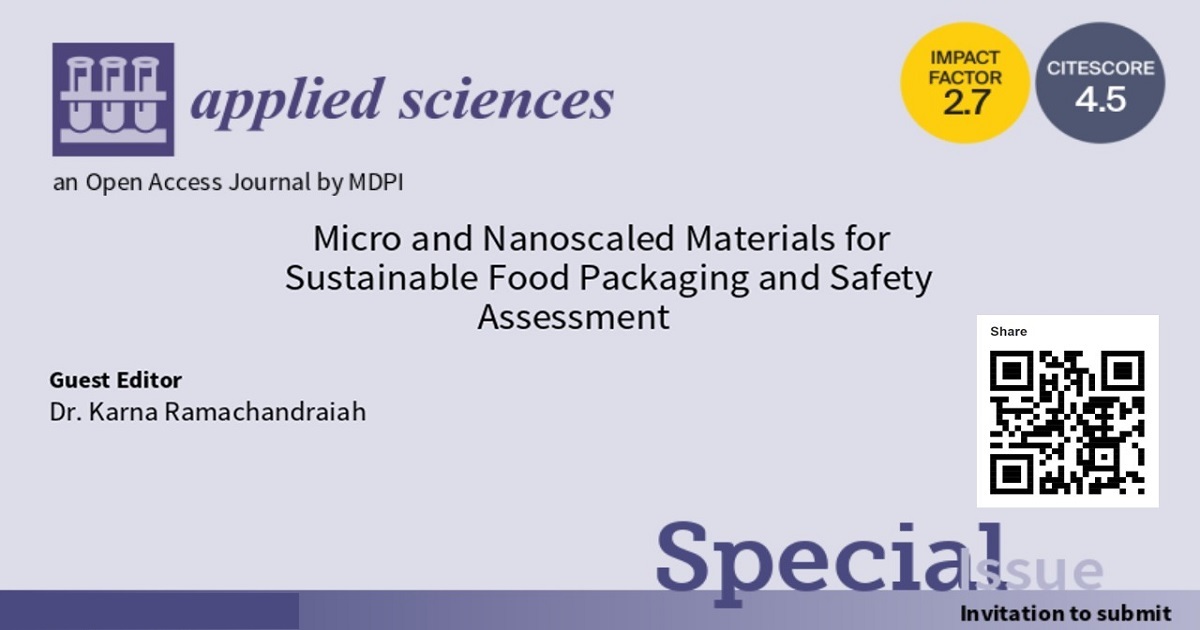- 2.5Impact Factor
- 5.5CiteScore
- 17 daysTime to First Decision
Micro and Nanoscaled Materials for Sustainable Food Packaging and Safety Assessment
This special issue belongs to the section “Food Science and Technology“.
Special Issue Information
Dear Colleagues,
The development of sustainable food value chains relies on improvements in production, aggregation, processing, storage, and distribution. In particular, the storage and distribution of plant- and animal-derived foods (minimally, moderately, and highly processed) are known to be essential parts of the food value chain. Therefore, increased attention has been given to the development of sustainable food packaging. In addition, lowering waste from packaging has also taken priority due to environmental concerns. Various types of micro and nanomaterials are being developed for food packaging applications that mainly focus on the control of water activity and temperature, as well as the incorporation of bioactive agents (antimicrobial or antioxidant activities). The other major areas of interest include the safety assessment of food products and food packaging. This is because fillers such as nanoparticles or chemical constituents can migrate from packaging (nanocomposite) to food products.
We invite authors to submit original research articles, reviews, and viewpoint articles related to the global efforts being made to improve all aspects of food packaging. We are also interested in articles that focus on materials (matrices and fillers), processes, value chains, and technologies, which can have a considerable impact on food safety. Topics of interest include but are not limited to:
- Novel nanocomposites;
- Polymeric nanoparticles;
- Metallic nanoparticles;
- Cost-effective and eco-friendly packaging;
- Novel micro and nanomaterials;
- Micro and nanoplastics;
- Nanosensors;
- Plant- and animal-derived food packaging.
Dr. Karna Ramachandraiah
Guest Editor
Manuscript Submission Information
Manuscripts should be submitted online at www.mdpi.com by registering and logging in to this website. Once you are registered, click here to go to the submission form. Manuscripts can be submitted until the deadline. All submissions that pass pre-check are peer-reviewed. Accepted papers will be published continuously in the journal (as soon as accepted) and will be listed together on the special issue website. Research articles, review articles as well as short communications are invited. For planned papers, a title and short abstract (about 250 words) can be sent to the Editorial Office for assessment.
Submitted manuscripts should not have been published previously, nor be under consideration for publication elsewhere (except conference proceedings papers). All manuscripts are thoroughly refereed through a single-blind peer-review process. A guide for authors and other relevant information for submission of manuscripts is available on the Instructions for Authors page. Applied Sciences is an international peer-reviewed open access semimonthly journal published by MDPI.
Please visit the Instructions for Authors page before submitting a manuscript. The Article Processing Charge (APC) for publication in this open access journal is 2400 CHF (Swiss Francs). Submitted papers should be well formatted and use good English. Authors may use MDPI's English editing service prior to publication or during author revisions.

Benefits of Publishing in a Special Issue
- Ease of navigation: Grouping papers by topic helps scholars navigate broad scope journals more efficiently.
- Greater discoverability: Special Issues support the reach and impact of scientific research. Articles in Special Issues are more discoverable and cited more frequently.
- Expansion of research network: Special Issues facilitate connections among authors, fostering scientific collaborations.
- External promotion: Articles in Special Issues are often promoted through the journal's social media, increasing their visibility.
- e-Book format: Special Issues with more than 10 articles can be published as dedicated e-books, ensuring wide and rapid dissemination.

